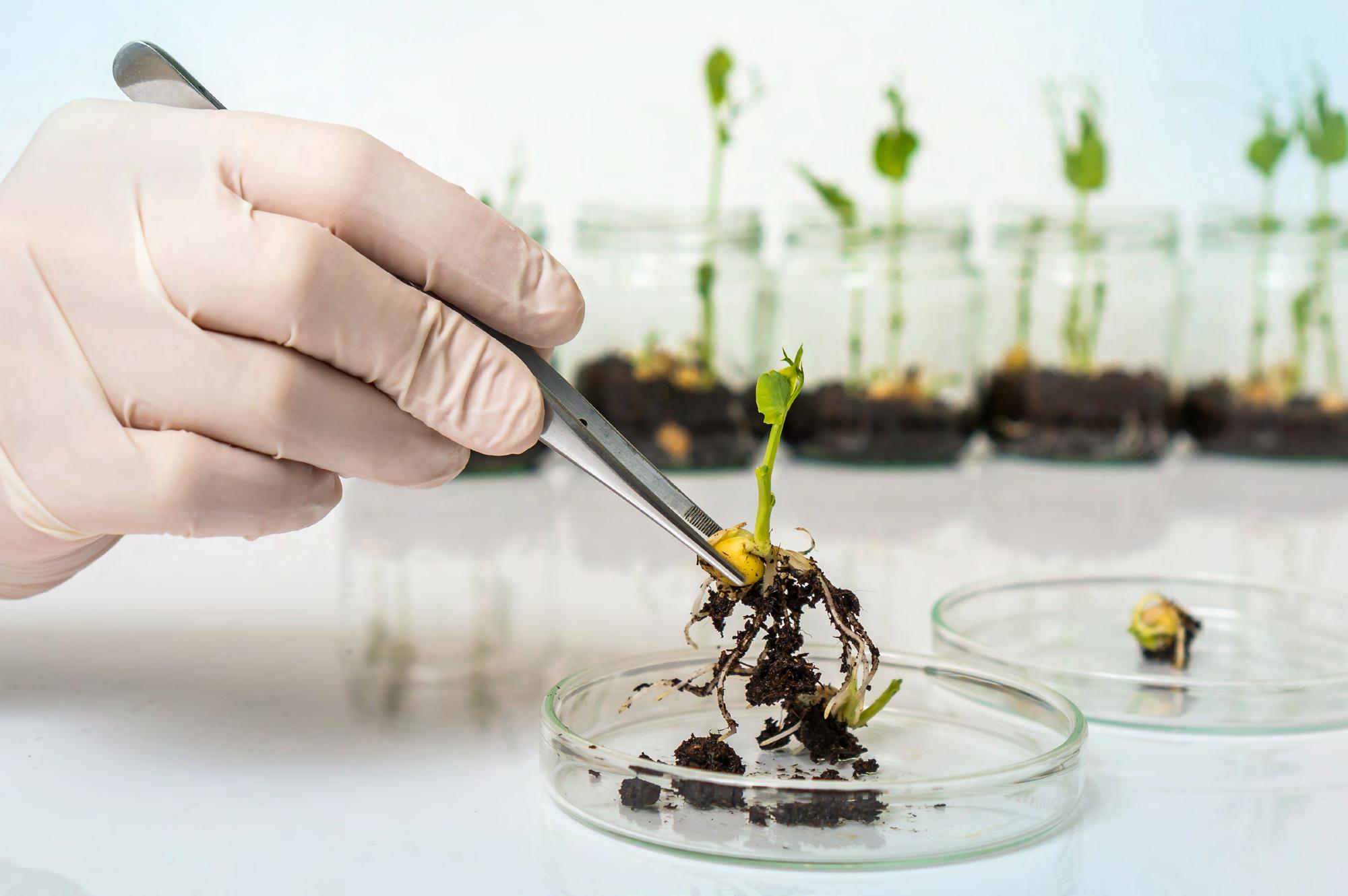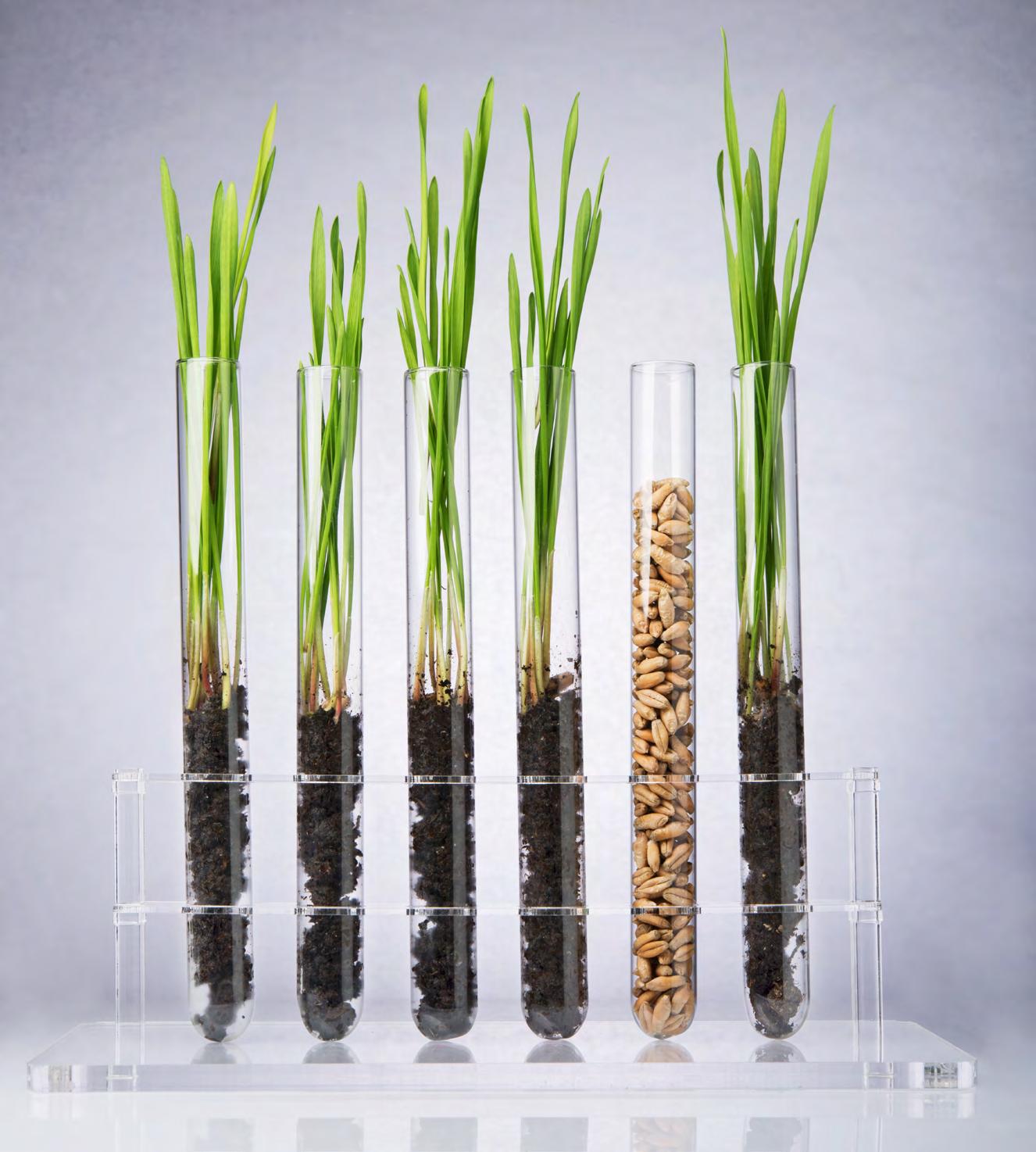
13 minute read
The Food Systems Summit and the role of food science and technology in sustainable food systems
Words by Jay Sellahewa
Throughout the history of mankind, food has played a critical role in all cultures by providing nourishment, improving our wellbeing, and connecting us with each other and our natural environment. Food systems not only transform agricultural products into tasty, nutritious, culturally acceptable, safe to eat and affordable foods, they also empower women in many developing countries and enable economic prosperity through the creation of employment.
However, the way that we currently produce, process, and consume food, together with the food losses that occur throughout the value chain, utilises significant amounts of finite resources and has an adverse impact on the environment. It has been estimated that food accounts for 60% of the losses in biodiversity and about a quarter of global greenhouse gas emissions, and agriculture uses half the world’s habitable land and 70% of freshwater water.1,2
Furthermore, current food systems contribute to inequality in the world resulting in underlying health and ethical issues with many people, mostly in affluent countries, over consuming and those in many poorer countries not having sufficient food, resulting in hunger, malnutrition and mortalities.
These problems are likely to continue and possibly get worse as the global population and affluence increase and conflicts, wars, climate related natural disasters, economic disorders and pandemics such as COVID-19 prevail. Therefore, the current food systems are not sustainable, and it is necessary to transform our food systems to assure food security and address hunger and malnutrition without compromising the health of our planet.
Sustainable food systems and the Food Systems Summit
According to the United Nations (UN) Food and Agricultural Organisation (FAO), a sustainable food system delivers food security and nutrition for all in such a way that the economic, social, and environmental bases to generate food security and nutrition for future generations are not compromised.
This definition ensures that sustainable food systems are profitable (economic sustainability), have broad based benefits for society (social sustainability) and have a positive neutral impact on the environment (environmental sustainability).3
The importance of transforming our current food system was recognised by the UN and, in early 2020, the UN Food Systems Summit (FSS) was formed to empower all people to leverage food systems to achieve all 17 Sustainable Development Goals (SDGs) by 2030 because food systems have some impact on all SDGs.4
With the objective of transforming the food system in the way we produce, consume, and think about food, this summit was referred to as the ‘People’s Summit’ and the ‘Solutions Summit’ to focus on the emphasis of widespread consultation with stakeholders and the need to find solutions to transform the food system.
During the 18 months leading up to the Summit, there was extensive consultation and engagement with various stakeholders across 145 countries, including relevant UN agencies, governments, small and medium-sized enterprises, representatives from indigenous peoples, youth and women’s groups, civil society, the private sector, scientists and academia. These consultations, which included nearly 1,700 dialogues with more than 109,000 people, were followed up with a pre-summit in Rome in July 20215 that was attended by around 500 people from 130 countries together with another 22,000 virtual delegates from 183 countries, representing diverse stakeholders.
The pre-summit covered a wide range of topics and there were many discussions on a number of subjects including the nexus between ‘people, planet and prosperity’, the importance of food in connecting all people, the role of marginalised communities, women and youth, impact of the food system on climate change, resilience to shocks, importance of local food systems, systems thinking, multi sector collaboration, role of the private sector, the finance systems and the role of science, technology, and innovation. In addition, there were many discussions on the role of governments and policy makers, civil society and other stakeholders.
The main Summit took place during the UN General Assembly in New York in September 2021, where the UN Secretary General issued a statement of actions together with pathways for food systems to deliver SDGs by 2030.6
In this statement, the importance of global collaboration among stakeholders (including farmers, governments, the research community and the private sector) and the need for urgent action was emphasised. Three fundamental areas for shaping progress were identified: • People – ‘Nourishing everyone for health and wellbeing’ • Planet – ‘Producing in harmony with nature’ • Prosperity – ‘Inclusive, transformative and equitable recovery for the 2030 Agenda’.
A feature of the Summit was the statements made by heads of governments and senior Ministers of many UN member states.7 It was proposed that action must be driven at country level by governments in their local contexts. Five broad areas for action were identified:6 1. Nourish all people 2. Boost nature-based solutions 3. Advance equitable livelihoods, decent work, and empowered communities 4. Build resilience to vulnerabilities, shocks and stresses; and 5. Accelerate the means of implementation. In addition, nearly 300 commitments were made by various stakeholders including member states and civil society, highlighting the Summit’s inclusive approach to accelerate action.8
Furthermore, recognising the fact that multi-sector, multi-stakeholder and inter-country (regional and global) collaboration is required to find practical solutions, several coalitions were formed.9 The UN Secretary General will convene stock take meetings every two years to review progress on the implementation of actions that will contribute to the achievement of the 2030 agenda.

The role of food science and technology
In their paper, Bounie et al discussed the role of Food Science and Technology (FST) in humanitarian response and highlighted how FST could contribute to humanitarian food systems.10 Many of the issues discussed in that paper are relevant to current and future food systems, especially in a context of recurrent threats and shocks, in particular the importance of developing resilient local food systems and the use of the core principles of FST to process local raw materials using appropriate technologies to produce nutritious,

safe to eat, affordable and culturally acceptable foods.
FST can also contribute to reducing food losses by preserving foods, creating employment, empowering women and youth by developing processing technologies to produce value added foods in local communities with territorial governance systems, and contributing to improving food security. In a related report issued by the HighLevel Panel of Experts of the UN Committee on World Food Security (2020),11 the impact of COVID-19 on food security and nutrition was discussed where the role of FST was referred to.
Although the UN Food Systems Summit engaged with scientists, and the role of science and innovation in transforming food systems was discussed and recognised as important, the role of FST was not discussed in depth and the focus of these discussions tended to be on agricultural systems and nutrition.
As there was a concern that the contribution food scientists, technologists and engineers could make in developing sustainable food systems in the proposed implementation plans for transforming the current food systems would not be fully captured at the FSS, the Humanitarian Food Science and Technology (HFST) Group prepared a discussion paper The Food Systems Summit – A call for integrating the role of food science and technology in sustainable food systems and was posted online.12
In addition, an online statement entitled ‘Including the specific role of food science and technology in the Food Systems Summit agenda’ (in English, French and Spanish) was posted through change.org.13 Within a week nearly 700 people from 77 countries endorsed this statement, which was subsequently submitted to the FSS Secretariat.
The HFST Group also submitted a commitment of action to the FSS community in raising and increasing awareness about the role that the FST community should and is ready to play, demonstrating the positive impact of FST in food systems through case studies and disseminating these experiences through education programs that addresses future generations.14
The Australian government supports the UN’s goal of delivering more sustainable, productive, and resilient agricultural and food systems for producers and consumers alike, and the Department of Agriculture, Water and the Environment (DAWE) took the role as Australia’s National Convenor for the Food Systems Summit.15
In this role, DAWE organised a series of National Food Systems Summit Dialogues, took part in the Pre-Summit and the main Summit, and signed on to three Coalitions of Action to tackle global food systems issues.15 The following pre-Summit dialogues were hosted by DAWE where representatives from CSIRO, universities, food producers and nongovernmental organisations (NGOs) participated: • Growing greener – food production and a healthy environment • Future proofing our food systems – boosting resilience • Eating for our health and the environment - balancing nutrition and sustainability • Australian food systems – addressing shared challenges and • Agricultural innovation – building better food systems. In addition, the following dialogues were convened by other Australian government departments, agencies, and collaborators: • Multi-stakeholder partnerships for scaling agricultural innovation • Achieving healthy diets from sustainable food systems by 2030 – what science, innovation, and actions are needed in Australia? • What role does food labelling play in helping to shift consumers towards healthier, safe, and sustainable consumption? • Food loss in food systems - collaborative research and priorities. Australia will continue to work with international partners to tackle global food systems issues and has committed to join the following three Coalitions of Action:15 • The Global Sustainable Livestock Coalition • The Sustainable Productivity Growth for Food Security and Resource Conservation • Food is Never Waste.
In his statement, The Minister for Agriculture, Hon. David Littleproud, reiterated Australia’s commitment to FSS and sustainable food systems and mentioned the Government’s investments in R&D and new technologies (eg, soil science, global commitments to carbon abatement and the biodiversity stewardship program). The Minister said Australia would continue to work with other nations and share the appropriate science to ensure the production of high-quality food within a better environment and a healthier and more sustainable food production system.7
As members of the HFST Group, some Australian food scientists and technologists from CSIRO, several universities and the AIFST, are actively contributing to increasing awareness of the role of FST in sustainable food systems and are taking part in implementation plans in collaboration with UN agencies and other global partners.
Conclusions and outlook
Food systems are crucial in connecting and nourishing people. However, the current food systems are not sustainable, have an adverse impact on the environment and have not solved the prevailing problems relating to global food insecurity, hunger, and malnutrition.
Following recognition by the UN of the need to transform food systems to achieve the SDGs by 2030, and the establishment of the FSS in 2020, significant progress has been made through the engagement of many stakeholders from all over the world.
The pre-Summit in Rome in June 2021 and the main Summit held during the UN General Assembly in New York in September 2021 brought together governments and other multi-sector stakeholders and discussions were had on key issues that will make a difference to human and planetary health by transforming the current food systems. The UN must be commended for initiating and organising this Summit with extensive consultation across many different and diverse global stakeholders.
Despite the extensive consultation processes that took place to identify the problems in current food systems and developing strategies to resolve current shortcomings, the important role of FST in post-harvest operations has not been adequately addressed in any of the five action tracks.
Therefore, it is important that the FST community continues to increase its involvement in, and contribute to the development of, sustainable global food systems. Furthermore, appropriate stakeholders (governments, relevant UN agencies, NGOs, the research community, the private sector and other appropriate actors in the food system) should work collaboratively and urgently and shift the focus from development to the implementation of plans so the UN SDGs can be achieved by 2030.
The UN should continue to take a leadership role in this initiative and should work closely with governments and other key stakeholders to ensure progress is made in a timely manner. However, it is up to everyone, including individuals and communities, to take responsibility to ensure positive changes to food systems take place.
This should result in a better world for all. A world that is devoid of the prevailing global humanitarian problems related to hunger, malnutrition, conflicts, poverty and inequality, without adverse impacts on the environment. A world that is able to face current and future threats and is sustained by resilient and sustainable local and global food systems.
References
1. It’s time to reconsider our food system, https:// www.wwf.org.uk/what-we-do/food
2. Environmental impacts of food production (2021), https://ourworldindata.org/ environmental-impacts-of-food
3. Sustainable Food Systems, FAO (2018), https:// www.fao.org/3/ca2079en/CA2079EN.pdf
4. UN Food Systems Summit (2021), https://www. un.org/food-systems-summit
5. UN Food Systems Pre Summit (2021), https:// www.un.org/en/food-systems-summit/presummit
6. Secretary General’s Chair Summary and Statement of Action on the UN Food Systems Summit (2021), https://www.un.org/en/foodsystems-summit/news/making-food-systemswork-people-planet-and-prosperity
7. Member State Statements, UN Food Systems Summit (2021), https://www.unfoodsystems. org/statements-summit.php
8. Commitments from stakeholders, UN Food Systems Summit (2021), https://www.un.org/ en/food-systems-summit/news/nearly-300commitments-civil-society-farmers-youth-andindigenous-peoples-and
9. Coalitions, UN Food Systems Summit (2021), https://foodsystems.community/coalitions/
10.Bounie et.al (2020). The role of food science and technology in humanitarian response. Trends in Food Science and Technology, 103,367-375, https://doi.org/10.1016/j. tifs.2020.06.006
11. CFS-HLPE. (2020). Impact of COVID-19 on Food Security and Nutrition. Rome: FAO, HLPE Interim Issues Paper (version 1), http://www. fao.org/fileadmin/templates/cfs/Docs1920/ HLPE_2020/New_HLPE_paper_COVID_EN.pdf
12. Humanitarian Food Science and Technology Group (2021), The Food Systems Summit - A call for integrating the role of food science and technology in sustainable food systems, https:// www.aifst.asn.au/resources/Documents/ The%20Role%20of%20FST%20in%20 Sustainable%20Food%20Systems_Final_9%20 Sep%202021.pdf
13. Humanitarian Food Science and Technology Group (2021), Including the specific role of Food Science & Technology in the Food Systems Summit agenda, https://www.change. org/p/fst-and-un-food-systems-summit-2021agenda?utm_source=share_petition&utm_ medium=custom_url&recruited_by_ id=dbee4640-55cb-11eb-b5f6-0b660d8c5e7c
14. Food Systems Summit Community, Commitments to Action, A call for integrating the role of food science and technology in sustainable food systems, https:// foodsystems.community/commitmentregistry/#commitments
15. Australian Department of Agriculture, Water and the Environment, UN Food Systems Summit (2021), https://www.awe.gov.au/biosecuritytrade/market-access-trade/un-food-systemssummit-2021
Jay Sellahewa is an Adjunct Senior Lecturer of Food and Health in the School of Chemical Engineering at UNSW, Sydney. He is also the coordinator of the global Humanitarian Food Science and Technology Group whose main objective is to increase awareness of the role of food science and technology in humanitarian response, and facilitate humanitarian projects where the application of food science and technology would lead to capturing social, economic, environmental and health benefits to affected communities.










